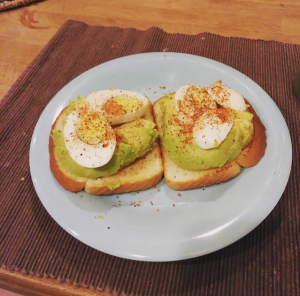Written by Alia Wulff, Cognitive Psychology Ph.D. Student
I’m sure most of you have been on your own for at least a few years. You’ve probably dabbled in cooking, maybe tried your hand at baking. You might make your own breakfast or bring lunch to the office. But a lot of you have probably (and totally understandably) been ordering food more often than you should be. It’s easy and delicious and even healthy on occasion. But it’s not cheap. And in grad school cheap is a top priority.
This blog post is not intended to magically turn everyone into amazing cooks. I just want to show you that it is possible, even easy, to grocery shop, cook, and meal prep like a pro while in graduate school for way less than it costs to eat out.
The number one thing to figure out is what you have to have in your pantry at all times. My staples are pasta, rice, beans (black, garbanzo, and refried), tortillas, tomato sauce, chicken, yogurt, eggs, bread (probably in bagel form), some fruits and veggies, and hot sauce. I can make a different thing for breakfast, lunch, and dinner every day for a week out of those items. Oil and seasonings are also pantry staples, but they rarely need to be replenished so they don’t really count.
The next order of business is figuring out where to get your groceries. It’s really hard for me to get to a grocery store and back because I don’t have a car, so I use Amazon Fresh. It costs me less for a monthly subscription than a Lyft from the grocery store twice a month would. With that service, my pantry staples cost me less than $50 a week. I generally order food twice a month and pay about $80-$100 each time. I’ve never spent more than $200 a month on necessary groceries. Don’t ask me about my Pringles and Twizzlers budget, though.
Next, plan your meals. You don’t have to go crazy and make a chart with dates, lists, and bullet points. Just know what you have in your pantry and make a list of things you can make that week. Then, when you get home you can check your list, find something that matches up with the energy you have left, and make that. Don’t try making a complicated feast when you’re dead on your feet or you will never try cooking again. My go-to lazy meal is to microwave some beans, pop them in a tortilla with some leftover chicken and rice, dash some hot sauce on there, and eat it without a plate because laziness and washing dishes do not mix.
Speaking of leftovers, here is an actual tip: make too much food. I know some people have weird issues with leftovers, but you are a grad student now and literally cannot afford the time or money to have wasteful beliefs about food. Make too much food on the weekends, pop the extras into containers, and then you have multiple meals for the week. Made too much chicken? Put leftovers in the fridge and have it with pasta or rice the next day. Made too much pasta because determining how much pasta to make probably requires the use of black magic? Pop some sauce (or some butter, I won’t judge) in it, portion it into containers, and – voila – you have lunches for a few days. Made too much rice? Make rice pudding for breakfast with flax or protein powder and use honey instead of sugar so you can pretend you’re not just eating pudding for breakfast (even though you are and that’s perfectly valid).
Pudding for breakfast is a reminder of the biggest point of this post: it’s important to not feel bad about food. You can ignore everything in this post as long as you remember this one thing. If you end up eating out more than you should have, if you eat unhealthy food for a few days, if you always put an extra bag of chips or pile of candy bars in your cart, you are not a bad person. You will always find something to beat yourself up about. Don’t let your personal method to replenish calories be one of them.


